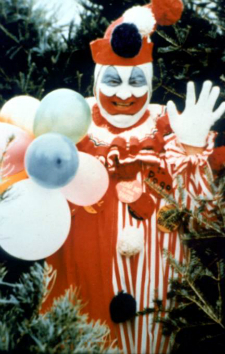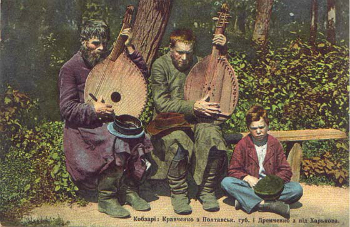5 WTF Mass Panics You Never Learned About In History Class

In Salem, Massachusetts way back in 1693, a whole bunch of people allowed a bunch of bratty youths to convince them that their town was overrun with witches. Wild accusations led to a bunch of executions, and ever since then, we've referred to any outbreak of baseless public hysteria as a "witch hunt." You might think that after such a powerful display of how quickly reason can abandon us, we would spot every potential mass panic from a mile away and nip it in the bud with logic and rational thinking before anyone got burned at the stake (literally or figuratively).
But that's not the case. As it turns out, we love witch hunts. We do them all the time, whether we're freaking out about clowns, the poor, or yes, even goddamned vampires. For instance ...
We've Been Having Mass Scary Clown Sightings For Decades
Over the past year, there's been an apparent wave of appearances of rogue clowns, waiting in the bushes to jump unsuspecting citizens with their possibly murderous and definitely excruciating comedy routines. In response to the public's growing anxiety over clowns, some towns banned clown costumes during Halloween, and Target even took clown masks out of their stores, because Target is often our first line of defense. So that's weird, right? Is this yet another example of 2016 going completely off the rails?

Well, perhaps not. As it might surprise you to learn, these were far from the first sightings of creepy roving clowns. One of the first recorded was in 1981 in Massachusetts, when schoolchildren reported seeing a van full of candy and men in scary clown suits. The police warned some of the nearby schools, and from there the phobia quickly spread, with clown sightings soon being reported in a number of nearby cities.

In fact, waves of clown sightings seem to come every three to four years, and generally follow the same pattern: Some kids tell the police about a clown offering candy or making ominous balloon animals or whatever, and when that story hits the news, other people begin reporting similar incidents. Yet every time the police look into it, they find no evidence of a sweeping movement of clown predators. In fact, few adults ever actually see any of the clowns. The whole thing soon dies down, and we all get back to our regular, clown-free lives for the next few years.
In the few verified cases in which a person has dressed up in a clown costume in any kind of menacing way, it's almost always been proven to be a viral movie marketing move, or a bank robbery or something harmless like that.

Still, that doesn't stop the clown phobia from getting out of hand. Consider the 500 vigilantes at Penn State who flooded the streets this year on the barest evidence of clown fuckery. Or this German teen with a clown mask who got stabbed after trying to scare his friends (which, if you think about it, means he succeeded).
Stalin Led The Charge Against Blind Folk Musicians
Ukrainian bards, or kobzars, were itinerant musicians who roamed from town to town, busking with their lute-like instruments. Almost always blind, kobzars were most often known for the dumas that they sung -- epic poems which celebrated Ukrainian greatness. This made them generally well-loved by Ukrainians, and an established part of Ukrainian society. However, one person who was famously not a fan of Ukrainian greatness was Joseph Stalin, which is perhaps putting it mildly, considering he once starved seven million Ukranian farmers to death. Around the same time he was doing this, he was also instituting policies to scrub out any aspects of Ukrainian culture he didn't like. Which was all of them. Which brings us to the poor old kobzars (who, again, were harmless, mostly blind minstrels).

Because of their habit of singing about how great the Ukraine was, Stalin passed orders for kobzars to be imprisoned, starved, or straight-up killed when they were found. He leaned on the press and other famous Ukrainian writers to denounce and mock the kobzars and their backwards singing, and he even tried to undercut their traditional instruments by dispatching goons to spread nontraditional instruments among the Ukrainian people, such as the harmonica and accordion. All these tactics, aside from being clumsy, mean-spirited, and/or evil, were also ineffective.

To remedy this, Stalin gathered over 300 kobzars for a "folk singers conference" to discuss the Soviets' desire to include them in the building of socialism (we imagine Stalin couldn't help but wink when he delivered this statement). As you may have guessed, Stalin had absolutely no interest in including the kobzars in any aspect of his empire, and the conference was nothing more than a ruse. You see, after the conference, the kobzars were loaded into train cars, ostensibly to be taken to Moscow for another similar event, only to instead be taken to the edge of the wilderness, where a series of trenches had been dug. Accounts vary as to whether they were shot and killed or left to die of exposure, but the bottom line is that Stalin had them taken out to the middle of nowhere and murdered. He hated folk music that much.

19th-Century England Waged War Against The Poor
Being poor sucks. And that's in our civilized, modern era, wherein we mostly ignore the poor. It used to be far more dangerous to be penniless. Back in Victorian England, for example, being poor was basically considered a crime. There were a few reasons for this, but at least one cause appears to be the panic caused by a wave of street robberies in the 1850s and '60s. Even though crime was on a generally downward trend at that point, the press grossly inflated the frequency and extremity of these minor robberies. Because most of the robberies were committed with the generous application of choke holds, they became known as "garroting," which did absolutely nothing to relieve the public anxiety over them.

This panic ignited a new battle in England's long-running trend of class warfare. Social reformers began describing the typical criminal as a lazy, unmotivated type who didn't want to do an honest day's work, which led to pretty much the entirety of the lower class being referred to as the "criminal class." Journalists would go undercover amongst these cutthroats, returning with sensational write-ups that talked about the poor as if they were thieving aliens. Almost every observer concluded that it wasn't poverty driving people to crime; it was some combination of drink, laziness, poor parenting, and above all, a lack of moral fiber.
Punishments for criminals soon took on all sorts of strange moral aspects, including Bible study, forced labor, and forced bouts of silence. Which isn't to discount the merciless piss-beatings, which were dispensed brutally and often, and extended even to children.

Thankfully, that era is long behind us, and we no longer blame the vague concept of crime itself on the poor and punish them with beatings and weirdly religious endurance trials. Nope, these days we simply fine poor people to death.
The U.S. Government Thought Homosexual Employees Were The Real Threat
Most people are passingly aware of the "Red Scare," the frenzied hunt for suspected Communists that gripped America in the '40s and '50s. But a less-reported aspect of this era was the government's parallel fear of homosexuals. Yep, at the very same time Senator Joseph McCarthy was braying like a donkey about the prevalence of Commies in the State Department, the government was also on the hunt for anyone with a hint of the gay about them. For instance, in 1950, the State Department forced 91 of their homosexual employees to resign, lest their gayness spread through the government like wildfire.
![BEGIN PURGING STATE DEPT. OF HOMOSEXUALS BY WILLIAM MOORE chieae Trlbune Press Serrlee] Washington, April 20-A senate appropriations subcommittee toda](https://s3.crackedcdn.com/phpimages/article/4/8/6/598486.jpg?v=2)
The fear wasn't strictly that these people were gay, but that gay people were more susceptible to blackmail, and therefore a much bigger security risk. The logic was that a homosexual member of the State Department would voluntarily give up state secrets if someone threatened to out them. So the obvious solution was to fire them all, because that certainly wouldn't create any disgruntled potential intelligence assets. This whole debacle was dubbed "The Lavender Scare," and wouldn't you know it, Senator Joe McCarthy was up to his ears in it as well. Being a big-time asshole, he'd often use accusations of homosexuality against his political foes, reportedly saying, "If you want to be against McCarthy, boys, you've got to be either a Communist or a cocksucker."

The whole thing reached a bigoted fever pitch in 1953, when President Eisenhower signed a bill stating that all gay and lesbian government employees were to be immediately fired. The bill resulted in the release of 425 employees in a single year for the mere suggestion of homosexuality. And before you say, "Jeez, this was such a backwards time," consider that this law was in effect until 1995. Thousands of people lost their jobs over the years because of it, and in 29 states, it is still legal to fire someone for being gay.
So although we might not be living through a Lavender Scare any more, we've still got a solid Lavender Apprehension and Misgiving to deal with.
The Great New England Vampire Panic
New England seems to be oddly susceptible to panics. Apart from the famous Salem Witch Trials, we've discussed in this very article the region's dubious history with clown sightings, and now we're can add another mythical monster scare to their scorecard: freaking vampires.

In the early 1800s, 200 years removed from Salem and what should have been a sobering lesson on the dangers of moral panics, the region convinced itself that it was now beset with vampires. Residents throughout New England decided that dead guys were rising from the grave to suck the life essence from the living. To protect themselves, residents began exhuming corpses, decapitating the bodies and burning their organs. That's a whole lot of work, though, so sometimes they would merely flip the exhumed corpse over, which is apparently sufficient defense against the undead. Maybe vampires have a terrible sense of direction and are easily confused.
It was a whole ordeal, too, often carried out in the dead of night with lanterns to guide the way. Henry David Thoreau wrote about an exhumation in his own journal, covering it like it was a normal thing to do on a Saturday night. Occasionally, the vampire hunters would also festively burn the dead guy's heart and inhale the smoke, or eat its ashes so that they themselves would not become a vampire. Again, it is unclear why this would help, but the important thing is they believed it would.

The horrific tuberculosis outbreaks going on at the time provide an almost plausible explanation for this insanity. You see, tuberculosis was called consumption back then, and a significant portion of the population appeared to think it was caused by dead people "consuming" the unsuspecting living. That's what all the corpse-exhuming was about -- they were looking for corpses that appeared "too fresh," as if they had been up all night the day before consuming the rosy-cheeked energy from living people. Now, this is obviously dumb, but to a 19th-century person with limited education watching all of their neighbors wither away, you can sort of see why the notion of vampires might cling to their thoughts (the vampire legend is a plague allegory, after all).
Also, the early 1800s were super boring, and it's not like those corpses were using their heads and organs anymore.
Justin is writing a free, spooky novel here. Vote for it. He writes other, less grim stuff on his website.
Also check out 5 Eerie Ways Entire Groups Went Insane Science Can't Explain and The 6 Most Insane Moral Panics In American History.
Subscribe to our YouTube channel, and check out Why All Of This Clown Stuff Is Bullshit, and other videos you won't see on the site!
Follow us on Facebook, and let's go date some vampires.